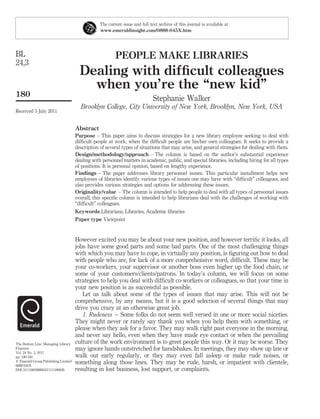This document summarizes strategies for dealing with difficult colleagues as a new employee. It identifies 10 types of issues that may arise, such as rudeness, annoying habits, inappropriate conversations, and not pulling their own weight. The summary provides suggestions on how to address these issues, including trying to understand the reason for the behavior, deciding if it rises to a level that cannot be tolerated, talking to the colleague, involving supervisors, and as a last resort, finding a new job. The goal is to help new employees successfully navigate challenges with colleagues.




